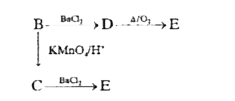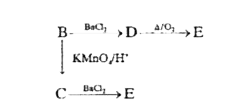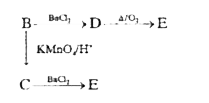STEP-(I): Na2CO3(aq)excessSO2−−−−−→'A'Na2CO3−−−−→'B'
STEP-(II):

Compound 'A' and 'B' are:
NaHCO3 and Na2CO3
NaHCO3 and Na2SO3
NaHSO3 and Na2SO3
NaHSO3 and Na2CO3
The correct Answer is:C
Topper's Solved these Questions
- SALT ANALYSISBOOK - GRB PUBLICATIONCHAPTER - SALT ANALYSISEXERCISE - Comprehension 43
1 Videos
- SALT ANALYSISBOOK - GRB PUBLICATIONCHAPTER - SALT ANALYSISEXERCISE - Comprehension 44
1 Videos
- SALT ANALYSISBOOK - GRB PUBLICATIONCHAPTER - SALT ANALYSISEXERCISE - Comprehension 41
1 Videos
- S BLOCK ELEMENTSBOOK - GRB PUBLICATIONCHAPTER - S BLOCK ELEMENTSEXERCISE - SUBJECTIVE TYPE
9 Videos
- THERMODYNAMICSBOOK - GRB PUBLICATIONCHAPTER - THERMODYNAMICSEXERCISE - All Questions
704 Videos
Similar Questions
Knowledge Check
STEP-(I): Na2CO3(aq)excessSO2−−−−−→'A'Na2CO3−−−−→'B'
STEP-(II):

E may be:ABaCO3BBaSO3CBaSO4DBaS2O3STEP-(I): Na2CO3(aq)excessSO2−−−−−→'A'Na2CO3−−−−→'B'
STEP-(II):

The compound 'D' when treated with dilute H2SO4 gives get with pungent smell and turns lime water milky. the compound 'D' is:ABaCO3BBaSO3CBaSO4DNa2SO3Consider the following two-step reaction sequence.
Step 1: Na2CO3(aq)excessSO2−−−−−→ANa2CO3−−−−→B
Step 2:
Compounds A and B areANaHCO3 and Na2CO3BNaHCO3 and Na2SO3CNaHSO3 and Na2SO3DNaHSO3 and Na2CO3
Identify the following:
Na2CO3So2−−→ANa2CO3−−−−→BElementals−−−−−→ΔCI2−−→D
Also mention the oxidation state of S in all the compounds.
View SolutionConsider the following two-step reaction sequence.
Step 1: Na2CO3(aq)excessSO2−−−−−→ANa2CO3−−−−→B
Step 2:
Compound D treated with dilute H2SO4 gives a gas with pungent smell that turns lime water to milky turbidity. Compound D is
View SolutionConsider the following two-step reaction sequence.
Step 1: Na2CO3(aq)excessSO2−−−−−→ANa2CO3−−−−→B
Step 2:
Here compound E, insoluble in dilute HCl, will be
View SolutionIn the following sequence of recation, identify the compounds (A), (B), (C ) and (D):
NSolutiona2CO3SO2−−→(A)Na2CO3−−−−→(B)S−−→Heat(C)AgNO3−−−→(D)
View SolutionSiCl4H2O−−→(A)Heat−−→(B)Na2CO3−−−−→Heat(C),
The compound (C ) is
View Solution
